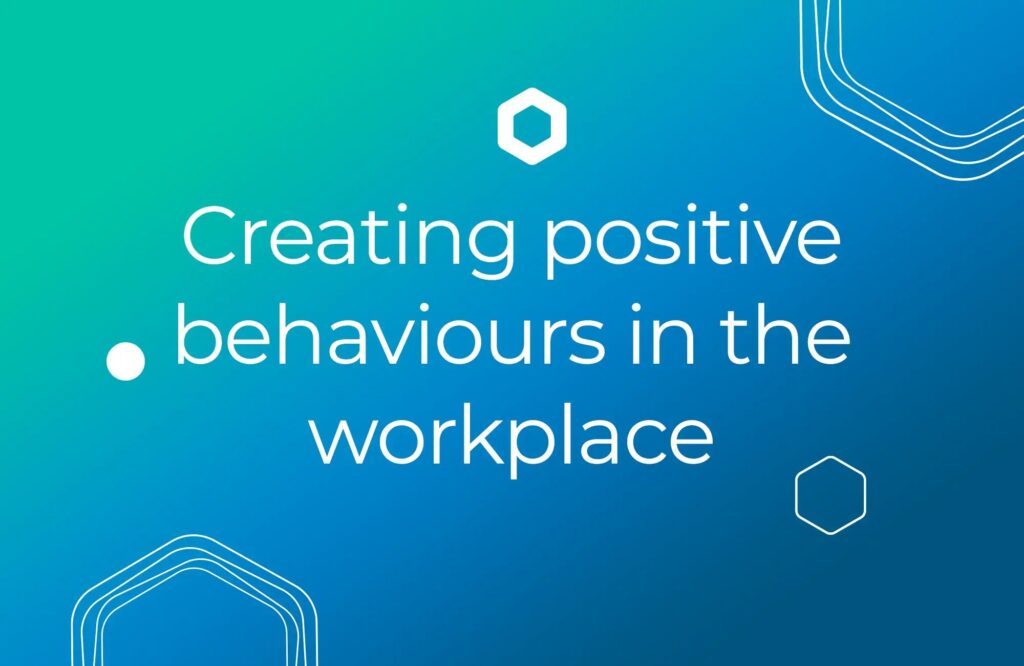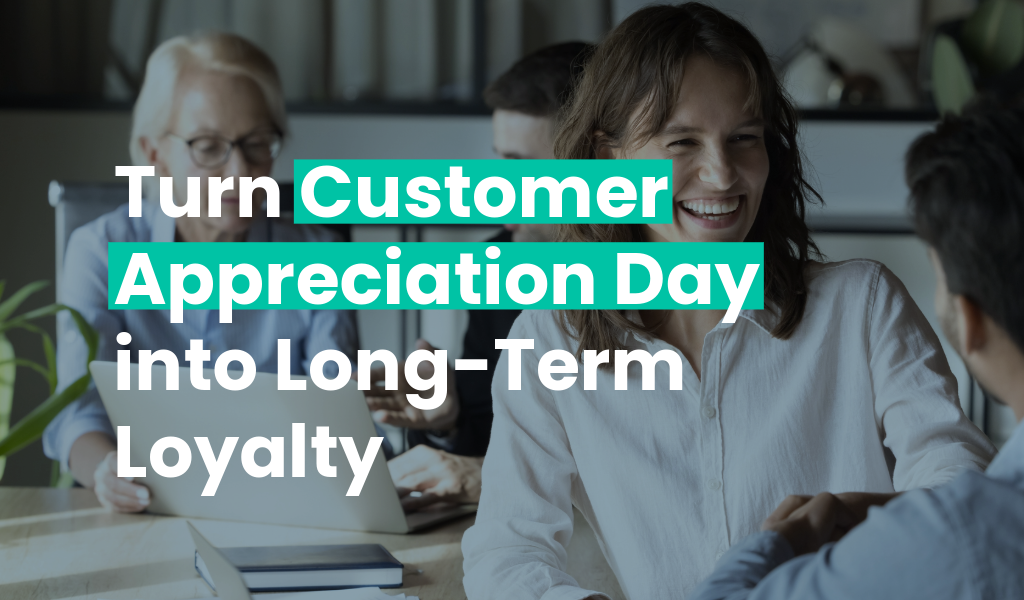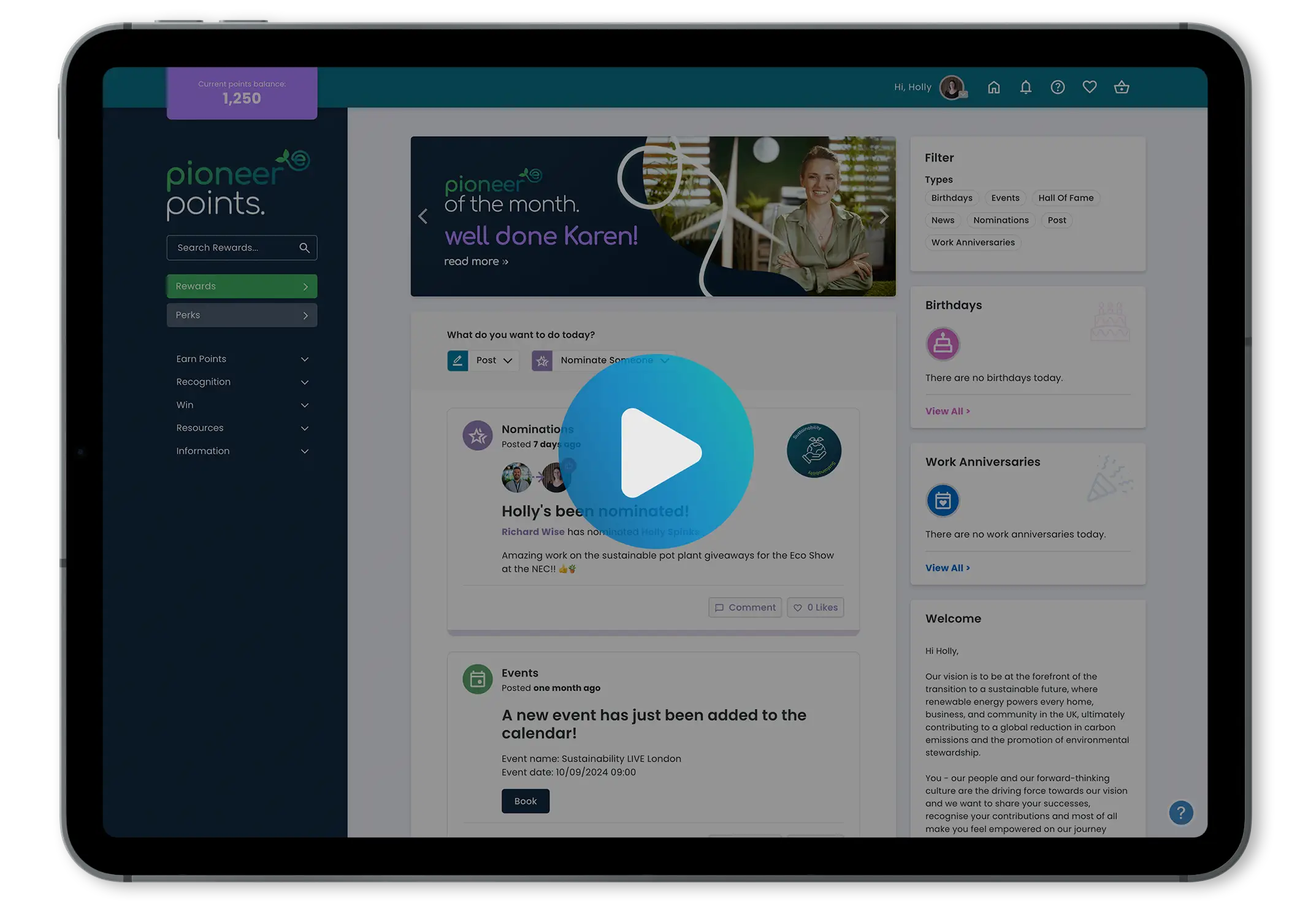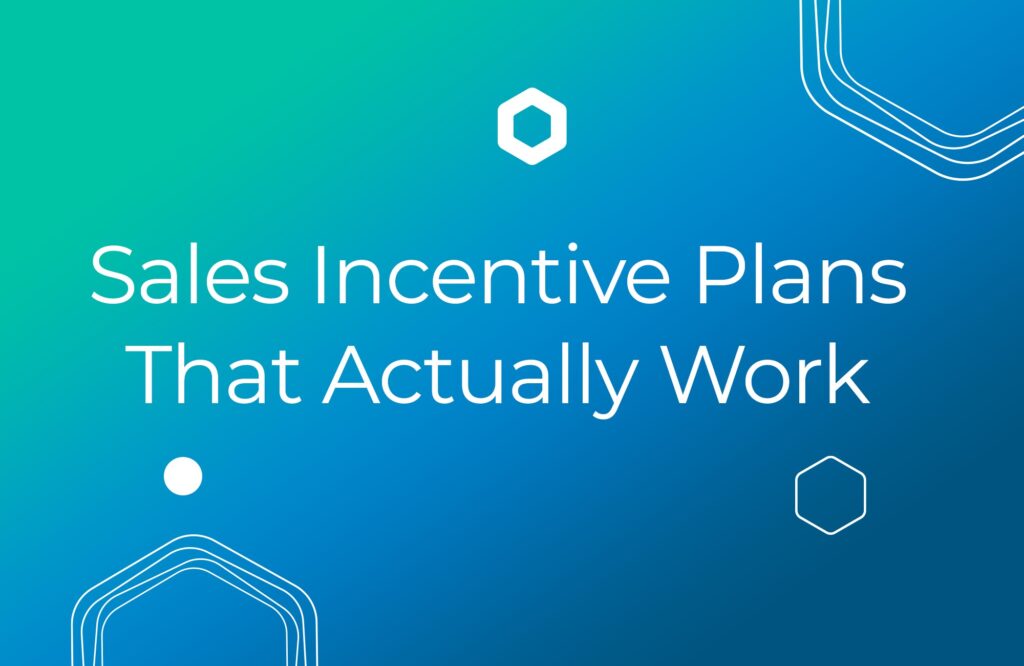


Effective sales incentive planning is essential to the success of any company with sales pros in need of inspiration. According to recent studies, a whopping 80% of successful companies use incentive programmes to motivate their sales teams. However, simply having an incentive in place is not enough to achieve your desired results.
The real key to success lies in effective incentive planning. Whether you’re kick starting a new incentive programme from scratch or improving an existing one, we’ll share some valuable tips to help you strategise and execute a successful programme that works for your business.
Skip to:
What are sales incentives?
Sales incentives refer to rewards or motivators provided to salespeople with the aim of encouraging them to achieve particular sales goals or objectives. The primary objective of sales incentives is to motivate sales reps to enhance their performance, meet or surpass their sales targets, and drive revenue growth for the company. These incentives are frequently associated with specific metrics, such as sales volume, sales value, customer retention or market share.
Implementing effective incentive programmes can help organisations improve their sales performance, enhance customer satisfaction and retain high-performing salespeople.

What are the different types of sales incentive plans?
There are five key types of sales incentives – role-specific, split incentives, presales, omnichannel, and analytics-based – let’s examine each:
 Role-specific incentives
Role-specific incentives
Every sales representative has a unique set of tasks that they perform to contribute towards the overall sales success of a company. Role-specific incentives are designed to recognise and reward hard work based on each individual’s specific responsibilities. They also show that a company values the diverse set of skills and responsibilities that each individual brings to the table, ultimately leading to a more productive and successful sales team.
 Split sales incentives
Split sales incentives
When salespeople team up to work on the same deal or project, it can create a situation known as “split incentives.”
To keep everyone working toward the same goal, companies can divide the incentives fairly among all team members or use custom criteria to determine how much each person receives. This approach is especially helpful for companies with a complex sales process that involves many reps. It promotes collaboration, communication, and a sense of teamwork among all team members, so everyone can focus on achieving success together.
 Presales incentives
Presales incentives
Presales incentives are a great way to motivate sales reps and keep them focused on their goals throughout the sales process.
These rewards recognise reps for their hard work at different stages of the sales cycle, even before a deal closes. This is especially beneficial for companies with long sales cycles because it keeps sales reps motivated and on track. The incentive can be given after accomplishing various milestones such as scheduling a meeting, conducting a sales demo, or even signing a contract. By rewarding reps for their efforts, presales incentives can boost team morale and ultimately help close more deals.
 Omnichannel incentives
Omnichannel incentives
As technology advances, more communication channels have become available for sales reps to interact with potential customers.
Omnichannel sales incentives take into account the efforts of reps across different communication channels, such as email, social media and phone calls. This means that reps are rewarded for the value they provide to potential customers throughout the entire sales process, regardless of whether or not the customer ends up making a purchase.
For example, even if a rep only makes initial contact with a lead via email, they can still be recognised for their efforts if the lead eventually makes a purchase online.
 Analytics-based incentives
Analytics-based incentives
Analytics-based sales incentives use data to create achievable sales goals and an optimal sales cycle. By analysing historical data, companies can determine the best practices that lead to successful sales outcomes. Sales reps are then rewarded based on behaviours that align with those best practices.
For instance, if historical data shows that a sales cycle length of X days is necessary to meet a revenue goal, salespeople will be rewarded for closing deals within or under that target timeframe. This approach motivates sales reps to prioritize their work and focus on achieving their targets.

What makes a good sales incentive plan?
Designing an effective incentive plan requires careful consideration of several key factors, including setting clear goals, fairness and transparency, achievability, timely and consistent payment, flexibility, integration with sales strategy and continuous improvement.
- Clear goals: Your incentive plan should have clear and specific goals that align with the company’s overall objectives, such as increasing sales revenue or improving customer retention.
- Fairness and transparency: The incentive criteria should be fair and transparent, with clear rules and metrics that are easily understood by all sales reps. It should also provide equal opportunities for all reps to earn incentive rewards based on their performance.
- Achievability: Incentives should be achievable for all sales reps, regardless of their experience or performance history. Unrealistic or unattainable targets can demotivate sales reps and decrease their engagement and productivity..
- Timely and consistent payment: There should be a timely and consistent payment schedule, with payments made promptly and accurately to sales reps who meet the goals or metrics. Late or inconsistent payments can reduce the effectiveness of the incentive plan and damage the morale of the sales team.
- Flexibility: Any plan should be flexible and adaptable, with the ability to adjust the goals or metrics based on changes in the market or business conditions. This can help to ensure that the incentive plan remains relevant and effective over time.
- Integration with sales strategy: The incentive plan should be integrated with the company’s overall sales strategy and culture, with a focus on reinforcing positive behaviours and attitudes that drive sales growth and customer satisfaction.
- Continuous improvement: Any programme should be continuously reviewed and evaluated to identify areas for improvement and optimisation. This can help to ensure that the incentive plan remains relevant and effective over time.

What format should a sales incentive take?
An incentive scheme can take many forms depending on the company’s objectives and the structure of its sales team. However, most plans generally follow a similar format that includes defining objectives, identifying metrics, setting targets, determining incentives, establishing qualifiers, creating a payment schedule, communicating the plan and conducting a thorough review.
By following this format, companies can design and implement effective sales incentive schemes that motivate their sales teams and achieve their desired outcomes.
- Objective: Clearly state the objective of the incentive scheme, such as increasing sales revenue or improving customer retention.
- Metrics: Identify the specific metrics that will be used to measure sales reps’ performance, such as total sales revenue, number of new customers, or customer retention rate.
- Target: Set achievable targets for each metric that align with the company’s overall objectives.
- Incentives: Define the incentive structure, such as a commission percentage or a bonus for achieving the target. The incentive should be attractive enough to motivate sales reps but not too high that it is unrealistic.
- Qualifiers: Outline any qualifiers that must be met before sales reps are eligible for incentives, such as a minimum number of sales or a minimum revenue target.
- Payment Schedule: Specify the payment schedule, such as monthly or quarterly, and the payment method, such as direct deposit or check.
- Communication: Communicate the incentive scheme to the sales team clearly and transparently, ensuring that they understand the goals, metrics, targets, incentives, qualifiers, and payment schedule.
- Review: Regularly review and evaluate the incentive scheme to identify areas for improvement and optimisation. This can help ensure that the incentive scheme remains effective and relevant over time.

Structuring a sales incentive plan
A sales incentive plan can be structured in various ways, but typically involves identifying the objective, aligning organisational goals, motivating the sales team, continuous reporting and evaluation.
 Identify your objective
Identify your objective
So, the reason you’re thinking about implementing a sales incentive programme is because you’ve got some goals you want to achieve, right?
Maybe you want to boost sales and revenue, or improve your customer service – or both. Perhaps you want to see more excitement and engagement from your sales team when you’re launching new campaigns.
Whatever your goals are, it’s important to write them down so you can keep track of what you’re trying to accomplish with your incentive programme. Having these goals in mind will help you measure the programme’s success over time and see if you’re hitting the benchmarks you set.
 Align with organisational goals
Align with organisational goals
Before creating an incentive compensation plan, it’s crucial to have a clear understanding of your organisation’s goals. These goals should be specific and measurable, and will guide the development of your plan.
To define these goals, you should consider questions such as:
- What are our current business objectives?
- What targets are we looking to hit?
- What are the key performance indicators (KPIs) that will measure our success?
Once you have a good grasp of these broader goals, you can start thinking about how to align them with your incentive compensation plan.
 Motivate your team
Motivate your team
Different reps will be receptive to different types of incentives.
For instance, lower-level reps might be interested in a performance-based competition for who can schedule the most demos, while more seasoned reps might be more motivated by a programme that offers a financial incentive for exceeding annual quota.
When creating your plan, take the time to understand what motivates your reps and design incentives that will encourage them to deliver on your organisation’s objectives.
 Communicate clearly
Communicate clearly
Your reps can’t operate within your framework if they don’t understand it. So if you want to see the results you’re looking for, you need to thoroughly explain what’s expected of them and what they can expect to receive if they perform to the standards you set.
Let your team know your organisational goals and how the compensation plan will play into them. Listen to any concerns they might raise. Your goals have to be realistic and reasonably attainable. If most of your team takes a look at your objectives and tells you that they don’t think they’ll be able to meet them — even with incentives — you might want to re-evaluate your strategy.
 Report continuously
Report continuously
To keep your incentive plan running smoothly, continuous reporting is crucial. You need to keep key stakeholders in the loop and have a pulse on how your sales pipeline is performing.
Reports that let reps keep tabs on their performance relative to quota, track high-level organisational performance, capture manager evaluations and give hard pictures of how effective your plan is, all need to be accounted for.
It’s essential to identify the most relevant metrics and reports and track them intently. Regularly reporting on the performance of your incentive compensation plan will help you refine it over time and make sure it’s delivering the intended results.
 Evaluate
Evaluate
To determine whether your plan is effective and worth repeating, you’ll need to conduct comprehensive evaluations from both higher-level and ground-floor perspectives.
Take a close look at the key metrics you landed on for gauging the success of your programme:
- Did you reach your goals on an organisational level?
- How did the figures you hit stack up against the ones you projected?
- How did your team fare personally within the confines of the plan?
- Did the programme put too much strain on morale?

How do you incentivise sales reps?
You can motivate and reward a sales team using commission-based rewards, SPIFFs, bonuses, profit-sharing schemes, reward and recognition plans, career development opportunities and contests, to name just a few.
Commission
Commission-based plans are common, and link the sales rep’s compensation directly to their performance.
The commission rate is predetermined and can be adjusted based on factors such as the type of product, the complexity of the sale, and competition in the market. This can be customised to suit the company and sales rep’s needs and provide clear incentives for sales reps to work harder and sell more.
However, drawbacks can occur if the commission rate is too low or too high, leading to a lack of motivation or aggressive selling practices.
Additionally, regulatory restrictions may prevent the use of commission-based plans in some industries.
Bonuses
Bonuses incentivise sales reps with a one-time or ongoing bonus payment for meeting or exceeding sales targets or performance metrics. Bonus amounts can vary based on the sales rep’s level of performance and customised to suit the company’s needs.
However, if the bonus is too small or too difficult to attain, it may not provide motivation, while if it is too large or too easy to attain, it may not be cost-effective. Fair and transparent metrics are essential to ensure the bonus is perceived as a fair reward.
Profit-sharing
Profit-sharing plans give sales reps a share of the profits generated by the company or a specific product line. The percentage of profit that is shared with sales reps is determined by the company and is usually based on predetermined formulas or calculations.
By tying the sales reps’ compensation to company profits, they become more invested in the company’s performance and are motivated to work harder to increase sales and profits.
Furthermore, profit-sharing plans can also help to retain top-performing sales reps, as they are more likely to stay with a company that rewards them for their efforts and contributions to the company’s success. It can also be an attractive incentive to new hires.
Reward and recognition
Reward and recognition offers non-financial incentives to sales reps to motivate them. These can include public praise, online recognition or special privileges.
The intention is to create a positive work environment that fosters engagement and belonging among sales reps. By recognising hard work, companies can improve morale and job satisfaction, which can lead to increased productivity, which will have a knock-on impact on sales performance.
It is also important to establish clear and objective criteria, such as specific sales goals, customer satisfaction metrics, or other performance metrics. This can help to ensure that the rewards and recognition are perceived as fair and meaningful by all.
Career development opportunities
Investing in your sales team’s career development is an excellent way to keep them motivated. By providing opportunities for training and mentoring, you’re not only helping them to improve their skills but also showing that you care about their professional growth. When sales reps feel invested in, they are more likely to be loyal and engaged in their work, leading to better results for your business.
Through training programmes and one-on-one mentoring sessions, sales reps can learn new techniques, refine their sales skills, and stay up-to-date with industry trends. In turn, this form of professional development can make them feel more confident in their abilities, which can translate to a better customer experience. Additionally, the skills they learn can benefit the company in the long run, as they become better equipped to tackle new challenges and opportunities.
Contests
Hosting sales contests can be a fun and exciting way to motivate your sales reps to achieve specific goals or targets. By rewarding the winners with prizes, such as cash or gift cards, you can create a sense of friendly competition amongst the team.
These contests can take many forms, such as a competition to see who can generate the most revenue in a month or who can close the most deals. By setting clear goals and guidelines for the contest, you can ensure that it is fair and transparent for everyone involved. By working together to achieve a common goal, your sales reps can build stronger relationships with one another and collaborate more effectively in the future.

How to run a sales incentive programme
In order to successfully run a sales incentive programme, it’s important to set clear and measurable goals, select the right incentives, track progress regularly, conduct evaluations to refine the programme, and celebrate successes.
A well-designed sales incentive programme can create a culture of achievement, which can contribute to your business’s success in meeting sales targets and driving revenue growth.
- Set clear goals: Start by defining the specific goals and objectives of the sales incentive programme. Make sure that the goals are in line with your overall sales strategy and company objectives. For instance, if you want to increase your sales revenue by 10%, set a specific revenue target and communicate it clearly to your sales team.
- Choose the right incentives: The right incentives can motivate your sales team to achieve the desired outcomes. Consider factors such as budget, competition, and what motivates your sales reps.
- Communicate effectively: Clearly communicate the details of the sales incentive programme to your sales team. Explain the goals, incentives, and criteria for earning incentives. Make sure that everyone understands how the programme works, what is expected of them, and how they will be rewarded.
- Track progress: Set up a system to track sales performance and progress towards the incentive goals. Use tools such as CRM systems or sales reports to monitor progress and adjust the incentive programme if necessary. Regularly review the data to ensure that you are on track to meet your sales goals.
- Evaluate and adjust: Continuously evaluate the sales incentive programme to identify what’s working and what’s not. Analyse the results and gather feedback from your sales team to make improvements in order to keep the programme relevant and effective.
- Celebrate success: Finally, recognise and celebrate the achievements of your sales team. Highlight top performers and share success stories with the wider team to encourage engagement and motivation. Celebrate achievements regularly to keep the momentum going and inspire your team to continue performing at their best.

Plan incentives carefully and you’ll maximise success
Creating a sales incentive plan that actually works requires careful planning, execution, and evaluation. It’s important to set clear and achievable goals, choose the right incentives, communicate effectively with your sales team, track progress, and evaluate and adjust the programme regularly.
Remember, incentives should motivate your sales team and align with the company’s overall objectives. Additionally, consider incorporating team-based incentives to encourage collaboration and healthy competition. Don’t forget to celebrate successes and recognise top performers to boost morale and maintain motivation.
By following these steps, you can create a sales incentive plan that not only drives results but also strengthens the bond between your sales team and the company.
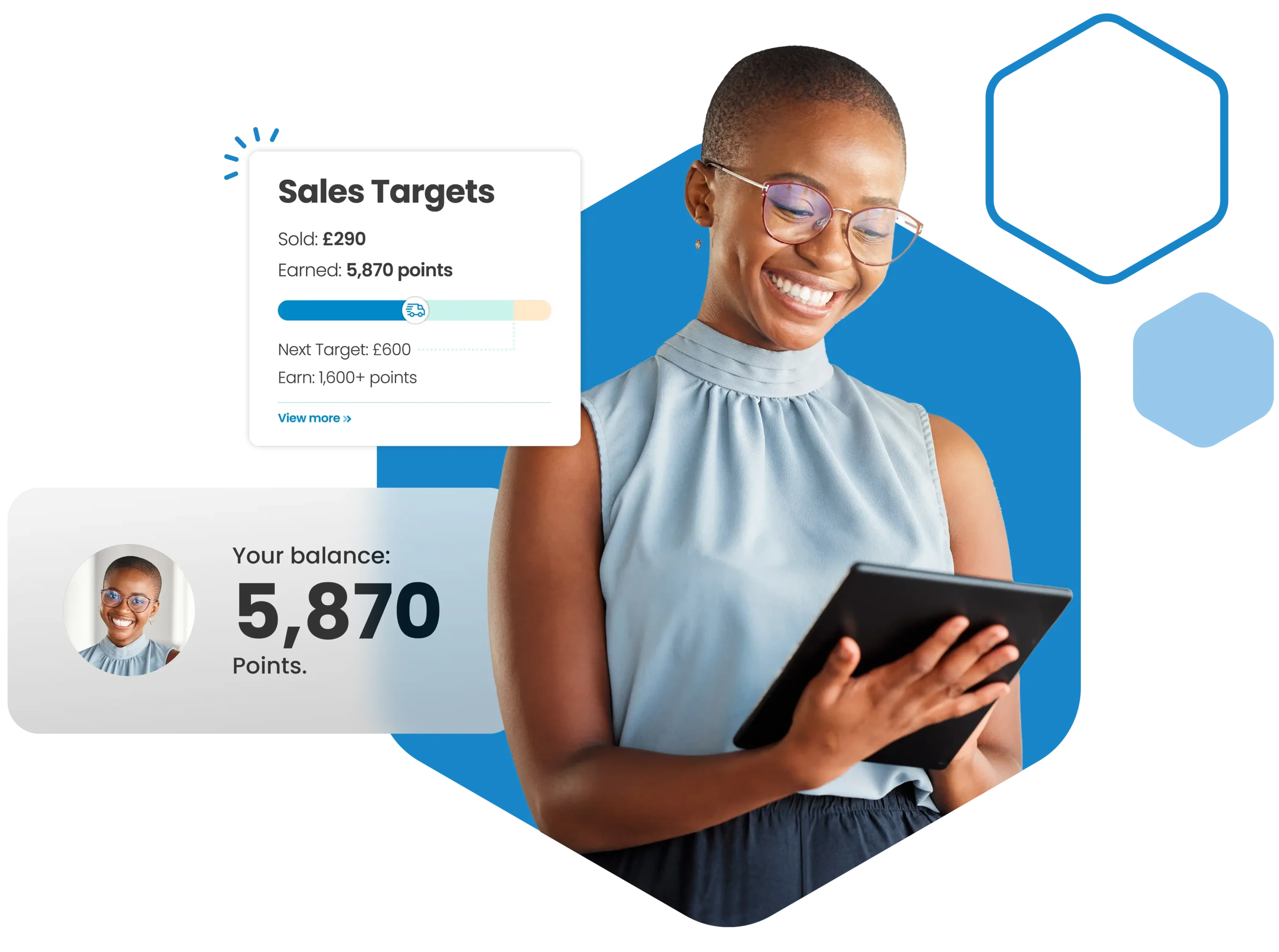


![How to inspire your sales team (and smash target!) {{ include_custom_fonts({"Poppins":["Semi Bold"]}) }}](https://no-cache.hubspot.com/cta/default/5921162/interactive-187541229676.png)


